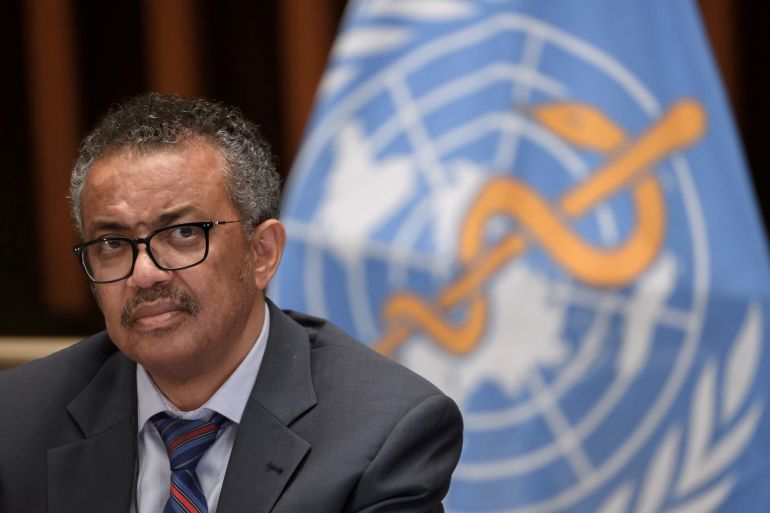WHO seeks 10 million COVID jabs for poorer countries
The United Nations health agency wants all countries to have begun a vaccination campaign within the first 100 days of the year.

The World Health Organization (WHO) has called for countries and companies worldwide to immediately share 10 million doses of coronavirus vaccines with the United Nations-backed COVAX scheme to deliver jabs to poorer nations.
“At the beginning of the year, I issued a call for countries to work together to ensure that all countries started vaccinations within the first 100 days of the year,” WHO Director-General Tedros Adhanom Ghebreyesus told reporters on Friday.
Keep reading
list of 3 items‘Justifiably unhappy’: Bosnia FM slams lack of COVAX vaccines
First batch of COVAX-supplied vaccines arrives for Palestinians
Now, 15 days are left to make sure that the 36 countries that have yet to administer a single dose will be able to start immunising at least their most at-risk populations, Tedros said.
Of these nations, 16 are scheduled to receive vaccines within the next two weeks, but 20 countries have yet to be allocated any vaccines.
“COVAX [the COVID-19 Vaccines Global Access Facility] needs 10 million doses immediately as an urgent stopgap measure so these 20 countries can start vaccinating their health workers and older people within the next two weeks,” Tedros said.
“COVAX is ready to deliver, but we can’t deliver vaccines we don’t have,” he said. “Ten million doses is not much and it is not nearly enough, but it is a start.”
COVAX, an international platform aiming to deliver two billion doses to the world’s poorest countries within the year, has often criticised high-income countries for having secured the vast majority of limited supplies of vaccines, contributing to a stark uneven distribution of shots.
As of Tuesday, The United States had administered 39 doses for every 100 people, compared with almost 14 per 100 in the European Union. By contrast, 0.68 shots have been administered for every 100 people on the African continent, according to Our World in Data.
This week, India dealt a further blow to global vaccine distribution, especially for lower-income countries, by temporarily limiting exports of the AstraZeneca vaccine produced within the country by the Serum Institute of India (SII).
Participants that were allocated jabs produced by the SII “will experience delays to deliveries that were originally anticipated to occur in March and April,” a United Nations Children’s Fund spokesperson told Al Jazeera, noting the deliveries of those vaccines “are expected to begin fully again by May, with catch-up deliveries to reach every participant’s full allocation up to May, accelerating thereafter.”
The AstraZeneca vaccine produced by the SII is pivotal to developing countries as it represents the core of vaccines destined for COVAX. So far, India has sent more than 60 million doses to 76 countries, mostly AstraZeneca shots manufactured by SII, the world’s largest vaccine maker by volume. Many countries have prioritised the AstraZeneca vaccine in their rollout plans. The shot is sold at cost and it is easier to store at normal temperatures than other vaccines.
India’s decision was made to meet domestic demand as the country is struggling with soaring COVID-19 cases and a sluggish inoculation campaign.
“That is understandable,” Tedros said, referring to India’s move to prioritise its own population. “But we are in discussion to keep a balance so that they can use [the vaccines] locally but at the same time continue to provide to other countries vaccines from the Serum Institute,” he added.
Gavi, the UN-backed international alliance, said in a statement that “SII has pledged that, alongside supplying India, it will prioritize supply to COVAX as the multilateral solution for equitable distribution.”